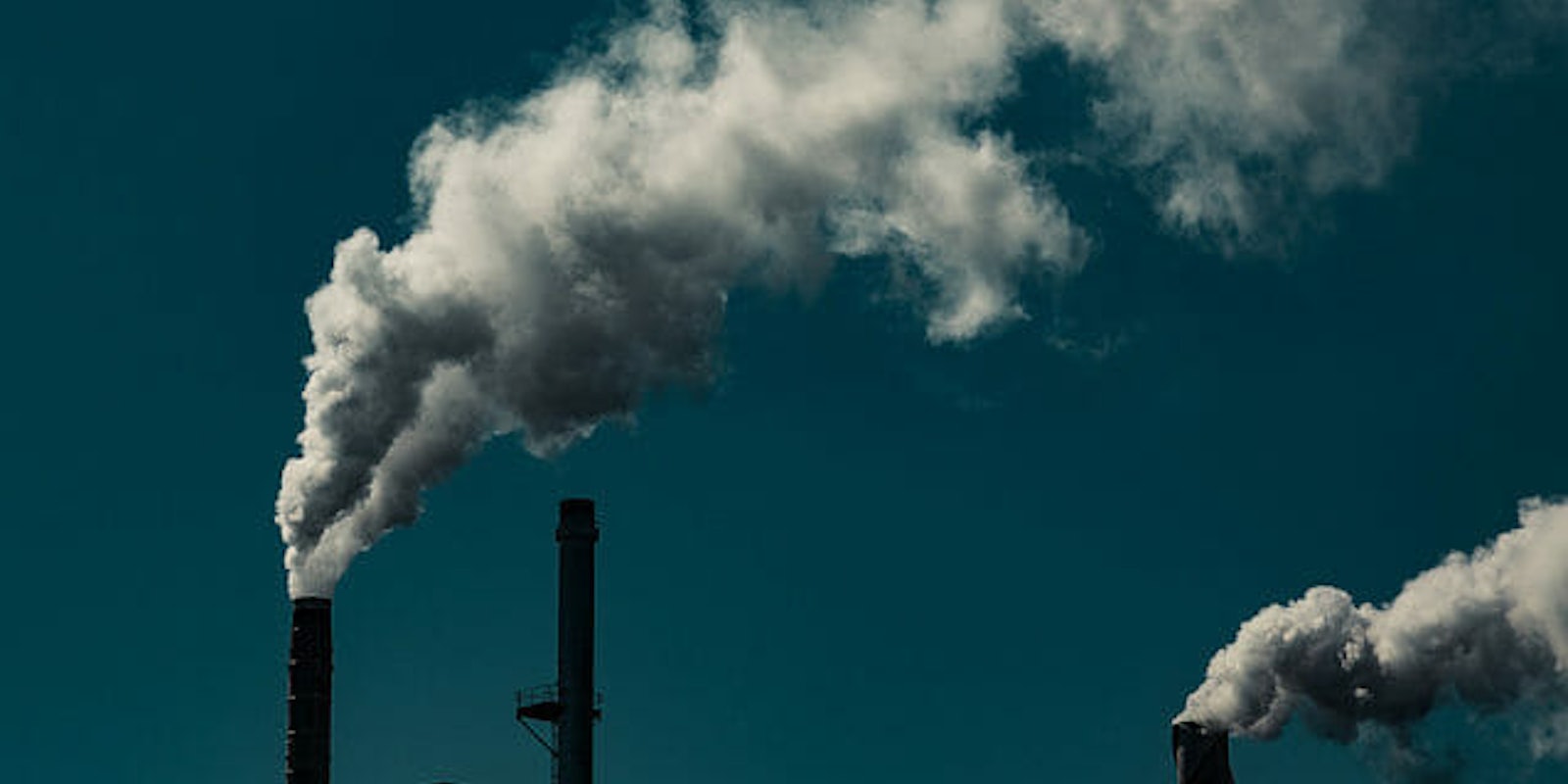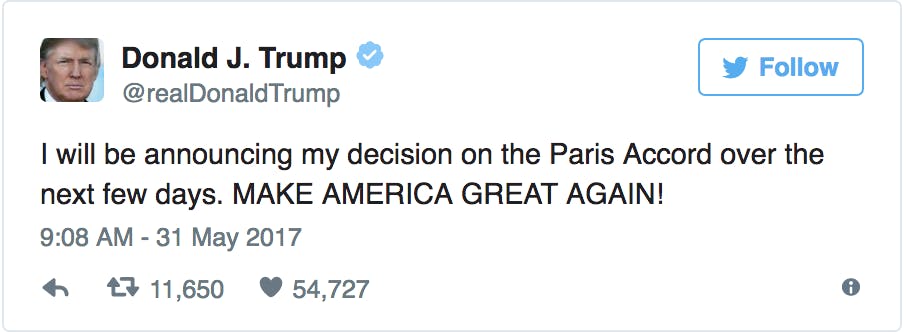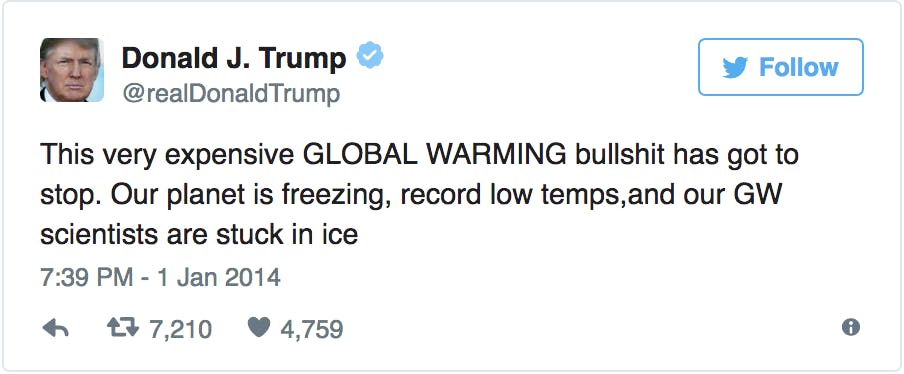President Donald Trump confirmed Thursday he will withdraw from the Paris Climate Accord. But what does this decision mean for the international community—and Earth itself?
Not unlike the president’s previous climate change decisions, it’s a drastic move that puts the United States at odds with the 195 other nations that joined the agreement to protect the environment on a global scale.
Here’s a breakdown of what’s at stake with the Paris Climate Accord, including what exactly Trump decision was about.
What does the Paris Climate Accord do?
The Paris Climate Accord (aka the Paris Agreement or Paris Accord) is the world’s first comprehensive climate agreement, went into effect on Nov. 4, 2016, under the United Nations Framework Convention on Climate Change. Enacted by former President Barack Obama, the Paris Climate Accord aims to keep Earth’s temperature below 1.5ºC above pre-industrial levels, invest $100 billion a year to address the effects of climate change, and lower greenhouse gas emissions worldwide. Since the vast majority of climate scientists agree the Earth is warming due to an increase in greenhouse gases, much of which is produced by human activity, it’s important that high-pollution nations like China, India, and the U.S. contribute to a global plan of action.
The contributions that each individual country makes to uphold the agreement are called “nationally determined contributions,” or NDCs. When Obama previously negotiated and ratified the agreement, the U.S. was committed to a goal of reducing total carbon emissions from 26 to 28 percent by 2025.
“Even if we meet every target, we will only get to part of where we need to go,” Obama said in a 2016 statement after ratifying the agreement. “This agreement will help delay or avoid some of the worse consequences of climate change, will help other nations ratchet down their emissions over time.”
Why is the U.S. exiting the Paris Climate Accord a big deal?
Whether the U.S. would remain in the Paris Accord was a huge dispute in the 2016 presidential election. Trump swore he would end U.S. involvement in the treaty from the get-go, while Democratic challenger Hillary Clinton supported the Paris Accord throughout her campaign.
In the wake of enduring climate change denialism and nationwide climate marches, climate science and legislation is always up for debate.
What’s an even bigger deal is that the U.S. is joining Syria and Nicaragua as the only non-participants. Basically, being involved in the international agreement is the status quo, even for smaller countries with much smaller carbon footprints.
Where does the Trump administration stand on climate change?
Trump’s refusal to express any support for climate issues is nothing new. He has previously referred to climate science as a “hoax” invented by the Chinese and global warming as “bullshit.” White House Press Secretary Sean Spicer didn’t answer when recently asked whether the president believes climate change is a result of human activity, but Trump has been pretty clear on Twitter.
For the Trump administration, climate change has become an issue of economic gain, and polluting industries are currently the primary beneficiaries.
On March 28, Trump visited the Environmental Protection Agency to sign an executive order that effectively squelched Obama-era climate policies like the Clean Power Plan, a measure to cut industrial and power plant emissions. The order also approved construction of major pipelines such as the Dakota Access Pipeline. Chief strategist Steve Bannon and EPA Secretary Scott Pruitt are avid supporters of leaving the agreement on the grounds that it would negatively affect the U.S. economy.
Some of Trump’s biggest campaign promises were to boost jobs and domestic fossil fuel energy production. This means increasing limits on how much carbon power plants could emit.
Last week, more than 20 high-profile Republican senators sent a letter to Trump urging him to back out of the deal. The letter states that Trump would contradict himself if he promises to reduce overall carbon emissions abroad yet continues to limit emissions at home.
Despite Trump’s decision, recent polls by the Washington Post show that the majority of Americans support staying in the Paris Climate Accord, including many Republicans.
Ivanka Trump, the president’s daughter, reportedly pushed to remain in the agreement along with Secretary of State Rex Tillerson, who argued that leaving the Paris Agreement would weaken the U.S. position internationally on environmental and energy issues. Secretary of Energy Rick Perry also reportedly took a stance against leaving the accord.
What’s the argument for leaving the Paris Climate Accord?
The argument for leaving goes back to Trump’s executive order on climate. Since it’s already been signed, many argue, the Paris Accord has already been greatly undermined.
The Clean Power Plan, widely backed by environmental groups, was seen by environmentalists and the Obama administration as the most effective plan for reducing carbon emissions. According to Republican lawmakers, though, the Clean Power Plan puts a ton of limitations on major energy companies and decreases job opportunities for coal workers.
With Trump’s decision to leave, those who supported leaving the Accord are likely to celebrate Trump’s statement about the creation of 6.5 million jobs—though it’s unclear where those jobs will come from—and less limitations for high-powered, high-polluting energy companies.
What’s the argument for staying in the Paris Climate Accord?
Environmentalists maintain that although Obama-era policies and climate change initiatives may be defunct, it’s important that the U.S. remain in the agreement in order to continue to be a part of the global conversation on climate change.
It’s also a matter of competition between high-polluting nations. For those who opposed leaving the agreement, the overarching fear was that nations with more volatile pollution levels like China and India could follow suit and abandon efforts to reverse or prevent climate change in favor of economic gain.
But according to recent climate reports, China and India both appear set to exceed their Paris Climate Accord pledges. As Trump prepared to step away from the Accord, China and the EU formed an alliance to strengthen their commitment to the Paris Accord.
“No one should be left behind, but the EU and China have decided to move forward,” EU’s climate commissioner Miguel Arias Cañete told the Guardian. “Now is the time to further strengthen these ties to keep the wheels turning for ambitious global climate action.”
What does this mean for the United States?
Pulling out of the Paris Accord doesn’t mean the U.S. is done with addressing climate change. It just means America is doing much less on a global scale when it comes to combatting global warming, and the burden will largely be shifted to the private sector to address.
While Trump did recuse the U.S. from any further compliance with the Paris Climate Accord, the U.S. could still be a part of future climate discussions. And with environmental groups calling for immediate action against the president’s decision, it’s likely these discussions will begin soon.
The U.S. is the second-largest emitter of carbon, exceeded only by China. Under Trump’s new plan, it’s likely that the country won’t reduce these emissions nearly as much as Obama’s previous policies predicted.
Editor’s note: This article has been updated for relevance.




